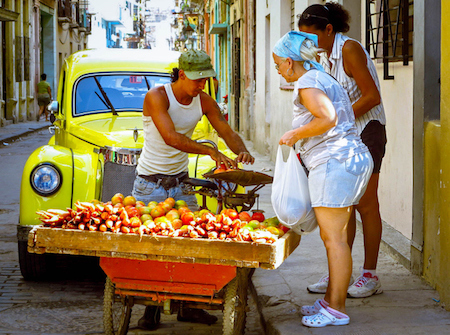I'd like to talk about consumerism in capitalist and communist countries. I don't know if anyone has actually noticed but Japan is very, what's the word, "consumerized." Everything is built for the consumer. You've got huge adverts, you've got talking trees, you've got people with microphones outside the shop screaming "Ireshaimase" at everybody as they go past. Everything is built for advertising, for consuming, for buying, for competing, for constantly making newer and better goods so people buy them. A complete reverse of this is somewhere like Cuba, which is one of the last sort of communist states around, and probably the only place where communism has actually worked. In Cuba everything is owned by the government so there's no companies competing with each other for advertising space, sort of trying to out do each other, and driving prices up, everything's done by the government, any adverts are for the same products owned by the same people. When I was living in Cuba we tried to explain how in a capitalist society, how consumerism would work, so I'd like to give you a quick example.
In Cuba there are many people selling really cheap orange juice on the street. They make it from like a, like a cordial, like a powder which they add water to and they dilute it and keep it cold and they sell it for the equivalent of about 10 yen a glass. Many people sell this. I tried to explain to my host family, OK, if this was, if we wanted to sell this orange juice in the street, we would find out the supplier, buy all of it, and then open up shop charging three times the price as anyone else. No one would be able to sell any because they couldn't naturally get a hold of it. The Cubans have no idea this would be a good idea. We received questions such as, "Why would you do that? But that would mean no one else could sell any. That would mean you would get all the money and no one else. We were like, "exactly!"
has worked
Probably the only place where communism has actually
worked.
When something 'has worked' it means that it has been
successful or functioned in the way that was planned.
Notice the following:
- I can't believe that it has worked!
- Our plan has worked! We won!
to out do
Competing with each other for advertising space, sort of
trying to out do each other.
When you 'out do' someone it means that you do something
bigger or better than them.
Notice the following:
- I will not let her out do me.
- If I do not try harder I will get out done.
drive up
Driving prices up.
When you 'drive something up' it means that you increase
its value.
Notice the following:
- When the schools in an area are good it drives the house
prices up.
- The new extension will drive the price of your hotel up.
equivalent
Sell it for the equivalent of about 10 yen a glass.
When something is the 'equivalent' of something else it
means that it is of equal value or the same as.
Notice the following:
- What is the equivalent of £50 in dollars?
- What is the American equivalent of a degree?
get hold of
No one would be able to sell any because they couldn't
naturally get a hold of it.
When you are able to 'get hold of something' it means that
you can acquire it easily. If you can 'get hold of someone'
it means get in contact with him.
Notice the following:
- Do you think we can get hold of any free samples?
- I will phone him now I might be able to get hold of him.
Vocabulary Quiz
equivalent • hold


















